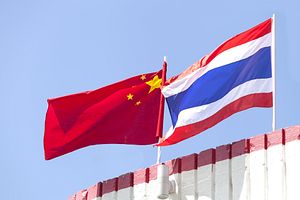Thailand’s ruling junta is boosting ties with China as it seeks to reverse sluggish growth in Southeast Asia’s second largest economy following a coup earlier this year that complicated its ties with the West.
On Friday, Thailand welcomed Chinese Premier Li Keqiang, the most prominent foreign leader to visit the country since the military seized power on May 22. Li was to attend a two-day regional summit on the Mekong river being held in Bangkok.
Thai government spokesman Yongyuth Mayalarp said Li’s visit and meetings would be “a good opportunity for Thailand to show that our political problems are not an obstacle to trade,” highlighting that “the situation here is normal now and we are working toward a new Thai democracy.”
Though the military has succeeded in stabilizing Thailand’s economy somewhat since coming to power, economic growth has been weak thus far and these woes could extend into 2015 if troubling trends like anemic domestic consumption and private investment continue. With the U.S cutting off military assistance to Thailand, and Europe suspending trade negotiations following the coup, the government has made strengthening ties with China – already Thailand’s largest trading partner – a top priority.
In that respect, the highlight of Li’s visit was the inking of two memorandums of understanding on developing a key rail project and the purchase of agricultural products.
The rail project, which costs around $12 billion, would construct Thailand’s first standard-gauge railway with two lines and fits into a broader Chinese plan to link its southwestern city of Kunming to neighboring Southeast Asian countries. For Thailand’s ruling military, the project is a key part of an ambitious $75 billion dollar master plan to upgrade the country’s transport infrastructure which it announced earlier this year.
“The railways are a very important issue…This is fundamental and will reinforce our cooperation with China,” Yongyuth said.
Meanwhile, the agricultural deal, according to the The Bangkok Post, would see China buy about 2 million tons of rice and 200,000 tons of rubber from Thailand. Although the exact volume has reportedly not been determined, the agreement would give the Thai government a much-needed place to offload the country’s rubber and rice stockpiles, and it is being advertised by Beijing as a grand gesture of Chinese beneficence.
“Only China has such a big market and a huge purchasing power which could consume the big agricultural production of rice, rubber and others of Thailand,” Li said.
While these agreements are promising, they are not new and could fall prey to old problems. Past plans for infrastructure schemes – including the current railway project – have been repeatedly delayed or suspended in Thailand over the last few years, in part because of ongoing political tensions. Some are also already questioning to what extent the country would actually benefit from this project given the way that it is structured.
Similarly, the agricultural deal is also an old idea in Sino-Thai relations with a troubled past. Just earlier this year, China scrapped a similar pre-arranged, high-profile deal to buy 1.2 million tons of Thai rice when a corruption investigation began into the Yingluck government’s agricultural subsidies scheme, which was advanced as a major reason for her subsequent ouster.
Specifics aside, the two MoUs may also be followed by other boosts to Sino-Thai relations which could spill over into 2015. Thai prime minister Prayuth Chan-o-cha is expected visit Beijing on Monday at the invitation of his Chinese counterpart Li. Next year also marks the 40th anniversary of diplomatic relations between China and Thailand, and both sides have already begun to plan out how they will strengthen ties even further in 2015.































